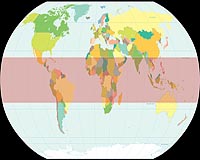| . |  |
. |
Paris (AFP) July 6, 2009 Leaders of the world's established and emerging economic powerhouses will be under pressure at this week's G8 summit to give a badly-needed jolt to the quest for a new global climate pact. Negotiators struggling to seal an agreement in Denmark by year's end say the three-day summit, opening on Wednesday in L'Aquila, Italy, is a golden opportunity to haul the process out of a rut. "It's time to make a difference," Yvo de Boer, executive secretary of the UN's Framework Convention on Climate Change (UNFCCC), where the post-2012 treaty is being brokered, told AFP. "It's one of those moments in history where leadership will be remembered, but failure will also be remembered." The L'Aquila meetings firstly gather the heads of the most industrialised nations -- Britain, Canada, France, Germany, Italy, Japan, Russia and the United States -- who will then huddle with leaders of the emerging giants. Together, their economies account for a whopping 80 percent of the heat-trapping "greenhouse gas" emissions driving dangerous climate change. Climate change has been an automatic part of the G8 since the Gleneagles summit in Scotland in 2005. But the results of three successive summits and lengthy communiques have been meagre, mainly due to a rearguard action by former US president George W. Bush, fighting demands for tough emissions curbs. With little more than five months left to the talks in Copenhagen many hopes are riding on Barack Obama, who has ripped up Bush's climate strategies. The G8 has prepared a draft communique calling on global emissions to peak by 2020 and then be "substantially reduced" to peg the rise in global temperatures to two degrees Celsius (3.6 degrees Fahrenheit) over pre-industrial levels. Alden Meyer of the Union of Concerned Scientists (UCS), a US non-governmental organisation, said the 2 C (3.6 F) objective was big news. "That is new and that is significant -- because you haven't had the US under President Bush willing to say anything about the two degree limit," said Meyer. But Meyer also noted there were no specifics among the industrialised powers on how to share out emissions curbs for 2020. Nor were there any details on how to help poor countries tackle climate change and their own fossil-fuel emissions. According to a German source, a push by Berlin for the G8 to agree a common goal for 2020 has so far met with a lukewarm reception, even from fellow Europeans. The European Union (EU) is targeting an eventual 20 percent fall on emissions, compared to 1990. For its part, the US has set itself a target of a 17 percent reduction by 2020 over 2005 levels, which represents only a four percent fall on 1990, a goal which the EU regards as insufficient. The 16-nation Major Economies Forum (MEF) -- which brings together the G8 members and emerging economies such as China, India and Brazil -- have scheduled a meeting on Thursday where leaders will also endorse the 2 C (3.6 F) goal. They will also support an "aspirational" global goal of halving emissions by 2050, according to a draft communique. Such pledges are fine but limited, said Brice Lalonde, France's ambassador on climate change. "It's easy enough to set out a target for 2050, but much more difficult for 2020. And what's more, any long-term objective will have much more credibility if you can explain how you intend to achieve it," he said. Meyer said the L'Aquila meetings faced a core dilemma. The G8 countries are reluctant to commit themselves to specific goals until they see strong promises on how emerging powers will avoid becoming the carbon culprits of tomorrow, he said. But poorer countries are loth to sign up to much until they see what rich countries are prepared to do. Green groups say the onus lies on rich countries that are historically most to blame for today's warming and best placed to shoulder the cost of dealing with the problem. "We expect and we need a clear signal from the G8 leaders on emissions reduction targets for 2020... If not the G8, who else?" asked Tobias Muenchmeyer, deputy director at Greenpeace's political unit. Share This Article With Planet Earth
Related Links Climate Science News - Modeling, Mitigation Adaptation
 Tropical zone expanding due to climate change: study
Tropical zone expanding due to climate change: studyMelbourne (AFP) July 6, 2009 Climate change is rapidly expanding the size of the world's tropical zone, threatening to bring disease and drought to heavily populated areas, an Australian study has found. Researchers at James Cook University concluded the tropics had widened by up to 500 kilometres (310 miles) in the past 25 years after examining 70 peer-reviewed scientific articles. They looked at findings from ... read more |
|
| The content herein, unless otherwise known to be public domain, are Copyright 1995-2009 - SpaceDaily. AFP and UPI Wire Stories are copyright Agence France-Presse and United Press International. ESA Portal Reports are copyright European Space Agency. All NASA sourced material is public domain. Additional copyrights may apply in whole or part to other bona fide parties. Advertising does not imply endorsement,agreement or approval of any opinions, statements or information provided by SpaceDaily on any Web page published or hosted by SpaceDaily. Privacy Statement |